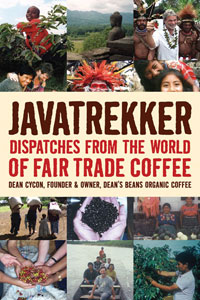| ||
Inside the coffee cup
by Joe Foster Social consciousness can be a deep and scary rabbit hole, and it’s difficult to know when you’ve gone far enough, or if that’s even possible. Do we have it in ourselves to be totally conscious of how our actions affect the world around us? Can we be totally aware at all times with everything we do? Probably not, but we can at least try. With that in mind, let’s talk retail dollars since the crazy-making season is officially in full swing. Now is the time that we, as a country, drop some serious cash. Now, most of that cash (or credit, probably) is spent in the spirit of giving, which in itself can be a beautiful thing. This, though, is where the scary rabbit hole comes in: to whom are we giving? The salami-log you bought obviously goes to your Uncle Jack, and the copy of How to be an Adult obviously goes to your asshole brother, but it goes deeper than that. You’ve also made a choice and given someone the gift of your business. One of the choices we make when we buy is whether or not the gift of our business goes to someone we know and care about. If you’ve chosen a chain, you’ve chosen to give a gift to someone who needs it less than someone closer to you. This choice takes money from your pocket and sends it, well, somewhere else. You don’t know where it goes. That cash goes to support another community in another town and you never see it again. If you make another choice, the choice to buy from a local business owned by local folks, your money stays here and gets passed around from business to business, local yokel to local yokel. America Unchained, on Nov. 17, was a celebration of this idea, and the buy local initiatives struggling to come into existence are working to raise this idea further into our consciousness. As a side note here, does anyone else think it’s really odd that Buy Local Campaigns are so often a liberal or progressive push? Why is the survival of local businesses that have been around for decades not a conservative ideal? I don’t get it. For me, though, it comes down to this: if you drive past a local business to buy your sprocket-sized whatsa-widget from a chain store, you’re killing your town. It’s even worse if you buy off the internet. Some would say this is extreme, but I don’t think so. A tree will die if enough slivers are removed from its trunk. There’s acting locally, but the rabbit hole goes deeper still, and conscientious people must think globally as well. There is no better demonstration of the power we consumers have than in the coffee trade. Coffee brings in more cash flow than any other global commodity other than oil. Dean Cycon, author of Javatrekker and founder of Dean’s Beans in Massachusetts, has written an account of his travels around the globe, or at least the parts that sit close enough to the equator to grow coffee, and his struggles in helping to form Fair Trade Cooperatives. Fair Trade is the idea of companies paying a fair price for goods, and so helping the people that produce those goods to thrive in a socially responsible way, rather than companies using their economic clout to impoverish and destroy the people that make them rich. I’ve over-simplified it, but what it really comes down to, in this part of the rabbit hole, is that we have the responsibility to buy from local merchants, and merchants have the responsibility to provide goods that do the least harm possible. This isn’t easy or even possible in some instances, but we have to try. As Cycon relates in Javatrekker, it’s incredibly difficult to get a Fair Trade Cooperative up and running, and he’s worked on and with dozens of them. He tells stories of corruption, threats, beatings and simple incompetence. He tells of sitting in meetings with groups of politicians staring blankly at him while he explains the benefits of Fair Trade, and he tells of those politicians acting very confused when he doesn’t hand over an envelope of money after his presentation. There are tales of governments quite openly skimming money directly out of the incredibly small profits of farmers, dooming them to malnutrition and death. He tells a story of a farmer who went through the process to be certified organic and supplemented his income and table by also growing, among his coffee trees, macadamia nuts and pumpkins. This man’s much poorer neighbors felt sorry for him, seeing his extra crops as proof that he was too poor to buy food. The social norms that create the cycles of poverty work from both the top and the bottom, and Cycon addresses all of it. He also speaks of his successes and the ways his work was able to make life better for his business partners. He’s a good storyteller and his self-deprecating style make Cycon’s stories both funny and morally frustrating at the same time. Check out Javatrekker and take a look into the rabbit hole at the bottom of your coffee cup and thankfully, you’ll never again take it for granted again. •
|
In this week's issue...
- December 18, 2025
- Let it snow
Although ski areas across the West have taken a hit, there’s still hope
- December 18, 2025
- Look, but don't take
Lessons in pottery theft – and remorse – from SW Colorado
- December 11, 2025
- Big plans
Whole Foods, 270 apartments could be coming to Durango Mall parcel


